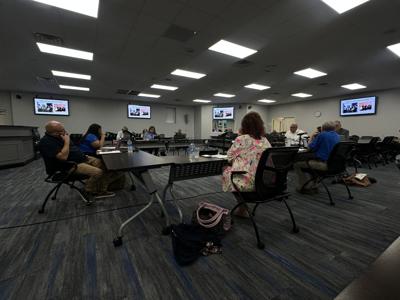
For Burke County Public Schools, the conversation surrounding students’ cellphone use isn’t simple. And with a policy that some board members feel isn’t working, the chair said the decision could come down to no phones at all.
When the board was discussing the North Carolina School Board Association’s policy updates during its Sept. 29 work session, Chair Tiana Beachler drew the board’s attention to the district’s current cellphone policy. Simply put, she said it doesn’t seem to be working.
The current policy, which was adopted in July 2022, prohibits cellphones or any communication devices during instructional time for high schoolers and prohibits them in general for elementary and middle schoolers.
For high schoolers, cellphones must be placed in designated areas once they enter the classroom. The devices may be used during lunch and class changes but are not allowed in restrooms and locker rooms. Should a student need to make an emergency call, they are supposed to communicate with their classroom teacher.
“While I understand that we live in a scary world, and cellphones are a means for parents to remain in contact with their children, I do hear rumblings, I’m in the schools, have kids in them … I’m still seeing them out,” Beachler said, adding that she is concerned the policy is seen as just a piece of paper because it’s not being followed.
Beachler said she doesn’t believe the issue is a lack of teacher adherence to the policy, but rather parents supporting their kids using their phones, which is counterproductive to the district’s efforts to keep students focused during instructional time.
Board member Sonya Rockett said that she sees both sides and that she hears from teachers that the policy is too demanding for them to realistically enforce.
“I’m not really saying for there to be a change now, but I say this will be a probationary year to see if we continue to see these issues,” Beachler said. “Because I’m at the point, quite frankly, where I want to take it a step further, and that looks like cellphones not available during the school day, not just during instructional time.”
Parents have voiced concerns about students not being able to contact them in case of an emergency, specifically during a lockdown or school shooting. They are also concerned that their children may need their devices to monitor health conditions.
But Beachler said that there are phones in every classroom and phones in the office, so in the event of an emergency, Public Relations Officer Cheryl Shuffler will send information out. If parents need to get information to their kids or vice versa, Beachler said there are many ways to do that.
“It is within our responsibility as a board to ensure that we are providing a basic and sound education, and if that means that cellphones are prohibited for students on school campuses during the school day, I’m willing to take that hit,” Beachler said.
Not only does she have concerns that students are distracted from learning, but schools have been having issues with harassment in the form of videos posted to social media during school hours.
“One kid being able to have access to this phone could be serving as an impediment for another student being able to be successful,” Beachler said.
Rockett suggested that the district beef up its enforcement this year when it comes to adherence to the policy at a staff level before deciding whether to do away with cellphones altogether. District staff still need to assess how students access the schools’ Wi-Fi. The district’s policy states that students are only supposed to use school Wi-Fi for instructional purposes.
The board agreed to revisit the cellphone policy next year to see what changes need to be made. Superintendent Dr. Mike Swan said that district staff would compile some discipline data regarding cellphones. He said several phones have been confiscated and some students have even been suspended.
Board member Brad Camp also suggested getting feedback from teachers on how they feel the policy is working in their classrooms. Swan added that district staff could send out a survey for staff to complete.
This conversation is not new and has been a hot topic among many school boards across the state and country. While many boards, like Burke’s, have already implemented different policies, a new North Carolina law that went into effect this school year prohibits student cellphone use during class time. So now, if they hadn’t before, school boards across the state are figuring out what works and what doesn’t.
Madison Lipe is the municipal reporter for The Paper. She can be reached at 828-445-8595 or madison@thepaper.media.

